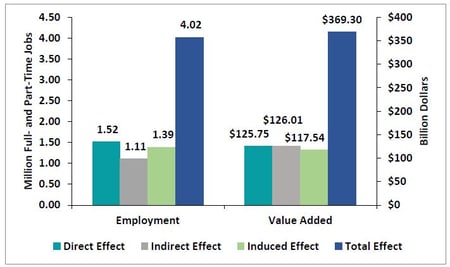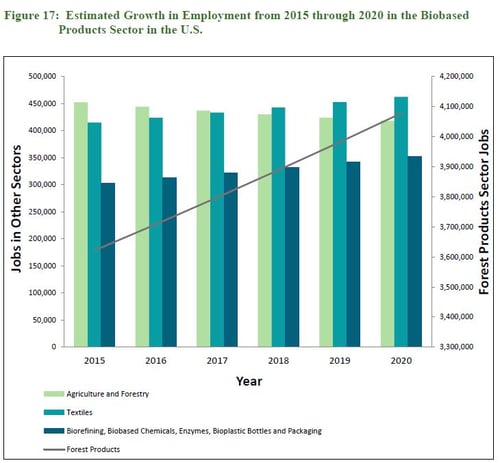2 min read
USDA Report: Biobased Products Boost Economy, Incentives Foster Growth
John Greene
:
June 24, 2015
Last month, we reported on the continued evolution of the Renewable Fuel Standard (RFS) at both the political and practical levels. While Environmental Protection Agency (EPA) recently disclosed proposed renewable fuels volumes through 2016, some feel that the numbers will not be sufficient to drive long-term growth in the renewables sector. However, the USDA recently announced changes to the 2014 Farm Bill that will create new growth opportunities for organizations involved in renewable resources by expanding the BioPreferred® program. The agency also issued a detailed report and accompanying news release that illustrate the monetary benefit the larger biobased products industry has on the American economy, and the numbers are quite compelling.
The June, 2015 report (utilizing 2013 data) does not include information on biobased fuels and other energy sources, but focuses on seven primary sectors that support the biobased products industry: forestry and agriculture, biorefining, biobased chemicals, enzymes, bioplastic bottles & packaging, forest products and textiles. Per the report, each job in the biobased products industry is responsible for creating 1.64 jobs in other sectors of the economy. In 2013, 1.5 million jobs directly sustained the biobased products industry resulting in 1.1 million indirect jobs in related industries, and an additional 1.4 million jobs created from the purchase of goods and services generated by these jobs. Broad economic impacts include:
-
4 million total jobs sustained
-
$369 billion value-added contribution to the US economy

Concerning expansion of the BioPreferred program, the report also states that, “The mission of the BioPreferred program is to facilitate the development and expansion of markets for biobased products. To accomplish this mission, the program has two broad strategic goals: 1) to advance the biobased products market and 2) to increase the purchase of biobased products government-wide.”
Agriculture Secretary Tom Vilsack said, "Today, we are also adding to the number of innovative products carrying USDA's BioPreferred® label and expanding options for our nation's biorefineries. This means small businesses and global companies alike can continue to harness the power of America's farms and forests to create new and innovative biobased products that are used all around the world."
Implications for the Forest Products Industry
Secretary Vilsack announced changes that will include new forest products in the BioPreferred program, along with proposed modifications to the former Biorefinery Assistance Program that will aid in the development of pioneering technologies for advanced biofuels, renewable chemicals, and biobased product manufacturing.
Per the Agency’s news release, “The final BioPreferred® program rules will no longer exclude mature market products (those that had a significant market share prior to 1972), providing consumers with more innovative wood products and other materials carrying USDA BioPreferred® label. Forest products that meet biobased content requirements, notwithstanding the market share the product holds, the age of the product, or whether the market for the product is new or emerging, also now meet the definition of ‘biobased product.’" The BioPreferred® program includes 97 distinct product categories representing over 14,000 products on the market today including lumber, packaging, chemicals, paneling, and much more.

The Secretary also said that USDA is making improvements to its Biorefinery Assistance Program by providing loan guarantees of up to $250 million for the construction and retrofitting of commercial-scale biorefineries and biobased product manufacturing facilities. Biorefineries that qualify for funding are permitted to produce more renewable chemicals and other biobased products rather than solely producing advanced biofuels. Also, biobased product manufacturing facilities would be eligible to convert renewable chemicals and other biobased outputs of biorefineries into “end-user” products.
The USDA news release also estimates that the use of biobased products displaces roughly 300 million gallons of petroleum per year, which is equivalent to removing 200,000 cars from our roads.





